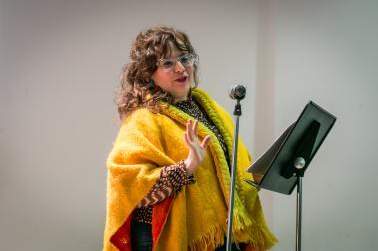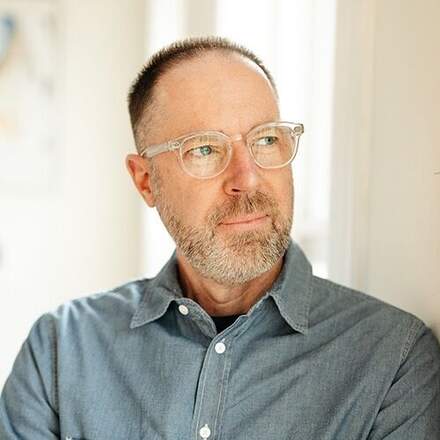About
Celebrating 15 Years of the Poetry Society of America’s Chapbook Fellowship
We launched this series of chapbooks, selected and introduced by distinguished contemporary poets, in 2003, bringing the total of poetry debuts as of this spring to sixty," said Alice Quinn, Executive Director of the Poetry Society of America, as she discussed the PSA's Chapbook Program, which publishes each winner's work as a gorgeous chapbook, allowing new voices to reach new audiences
"We launched this series of chapbooks, selected and introduced by distinguished contemporary poets, in 2003, bringing the total of poetry debuts as of this spring to sixty," said Alice Quinn, Executive Director of the Poetry Society of America, as she discussed the PSA's Chapbook Program, which publishes each winner's work as a gorgeous chapbook, allowing new voices to reach new audiences. On June 6, 2018, the PSA and its supporters gathered at the Frederick P. Rose Auditorium at Cooper Union to celebrate 15 years of this successful program—and to honor this year's winners.
With so many worthy manuscripts, the judging process is a difficult one. Quinn quoted Nick Flynn in his introduction to Alicia Salvadeo's chapbook in 2013: "Every page is murmuring at once. My job, my impossible job, is to choose one manuscript from this cacophony . . . I begin reading poems, a few from this book, a few from the next, until, like all books, they begin talking to each other." For Quinn, Flynn captured "how these volumes have been chosen for 15 years, with passion, commitment, discernment, and often exultant joy."
In Brenda Shaughnessy's stead, Dorothea Lasky introduced Nicholas Goodly, who captivated the room as he read with intensity from his chapbook Black Swim. In his poem "Siren," he writes, "Each night I peel back / every iridescent scale / for a mound of flesh / I can agree with."



Introducing her choice of winner, poet and judge Cate Marvin expressed how she found it difficult to narrow down her selection. It's "like being in a room with a lot of voices competing for attention," she said, and went on to say that the "manuscript has to have an athleticism to keep your attention." Marvin selected What Kind of Omen Am I by zakia henderson-brown and expressed her love for the chapbook's title, which—henderson-brownshared with the audience—comes from rapper Black Thought's song "Making a Murderer," from his Streams of Thought album.


Marvin was "really impressed by the technical know-how of this poet." Even more admirable, she felt, is the fact that zakia writes about a variety of topics, and doesn't shy away from the personal or the political. This immediately became evident as henderson-brown read her first poem of the night, entitled, "I Was Getting Out of Your Way." Sandra Bland was a Black woman who was pulled over by the police and unjustly arrested and who later died in police custody. According to the transcript and video of Bland's traffic stop, she told the officer, who was tailing her, that she was getting out of his way. In henderson-brown's poem, she writes, "Sudden rain catches me and I cinch / Like a ball of rubber bands, a noose thirsty // For air—then run, past an idle siren / Posing as a red vase: an empty vessel."
Just as it was for Marvin, for Kyle Dargan, a poet and judge, narrowing down the fifty manuscripts he received to just one winner amounted to an "agonizing" decision. He ultimately selected Professional Crybaby by Emily Hunerwadel but said that there were at least "five or seven worthy manuscripts," and that he didn't take his decision lightly, knowing what it would mean to the other contenders.


He then introduced Hunerwadel—but not before extolling the virtues of Black Thought, "the most underrated rapper of all time." When I previously asked about his choice, Dargan said he's "excited about people having the opportunity to read it." That enthusiasm came through as he didn't read any of his own work, instead opting to give as much time as possible to Hunerwadel's. He found joy in her poems, and referenced Four Reincarnations (Milkweed Editions, 2016), the debut collection of Max Ritvo, a 2015 PSA Chapbook winner, as an example of "attention and attentiveness," which he also sees in Hunerwadel. She read several poems, including "Silk Sheet," which opens, "What you think is my hand is really the papier-mâché brain I made in seventh grade. The cerebellum traces the love-line along my left palm. That thalamus is a fault line, dividing what is and isn't desert sand away from you." For this poet, poetry brings people together. With her friends from Alabama in the audience, Hunerwadel's sentiment certainly rang true. She felt "grateful to . . . poetry in general."
Poet and judge Patrick Rosal spoke of the importance of the Chapbook Fellowship, relating that his own first publication was a chapbook. When he went back to Sarah Lawrence College and flipped through the pages of his thesis in the campus library, he was surprised at how few of the thesis poems made it into the chapbook. But he was "blown away at the maturity...[and] skill in the service of music and vision" that characterizes the work of Esther Lin whose manuscript he selected. When Lin took the stage, she read her titular poem, "The Ghost Wife," which was inspired by a folktale that her dad told her the day after her mom died. In it, Lin writes, "I don't know Chinese / stories of daughters. My / father tells me stories / of wives instead. Of beasts / and spirits who marry men. / Like the Ghost Wife / who, after years of service/ to her human husband,/ years of rearing / their strapping boy, / is scorched by the sun."



At the reception after the program, as the halls were abuzz with poets and friends swapping stories and sharing in the excitement of this moment, I flipped through the chapbooks, beautifully designed by Gabrielle Wilson. According to PSA Executive Director Alice Quinn, "any good designer is going to chafe against restraint," and this year Wilson eschewed the Dutch textile design book from which many earlier cover designs were drawn and instead reached out to English designer Kitty McCall, whose patterns adorn this year's whole set. Apart from the powerful words themselves, the look and feel of each chapbook contributes to the feeling that, as Marvin said, each object is "a book-book." This is clearly a testament to the care and attention that the PSA provides each poet through this fellowship.
I was able to catch up with a number of the winners. As they signed my books, I learned more about their respective backgrounds and what this award means to them both personally and professionally.
This is Nicholas Goodly's first chapbook, and he has loved being "thrown into a community of dynamic people." It is an "unreal and humbling" experience.
For Emily Hunerwadel, the Chapbook Fellowship provides a huge confidence boost. Confidence, or lack thereof, can "make or break a career," she said. Originally an engineering major, she stumbled into a poetry class and immediately fell in love with the medium. This also marks her first big publication, and she now feels like she can take more risks because people believe in her work. As an MFA candidate at UMass Amherst who will start teaching in the fall, it is "exciting to share poetry with people who may not have experienced it." That sentiment is certainly at the core of the PSA's mission, and it was wonderful to see the PSA give a platform to these emerging voices, these poets poised to make—or already making— their mark on the world.


